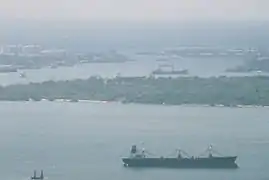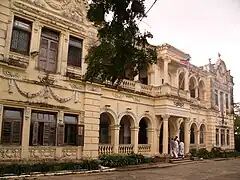| Kilindini Harbour Mombasa Port | |
|---|---|
 Port of Mombasa | |
Click on the map for a fullscreen view | |
| Location | |
| Country | |
| Location | Mombasa, Mombasa County |
| Coordinates | 4°03′19″S 39°39′07″E / 4.05528°S 39.65194°E |
| UN/LOCODE | KEKIL[1] |
| Details | |
| Opened | 1896 |
| Type of harbour | Natural/Artificial |
| Draft depth | 17.5 m (57 ft) |
| Statistics | |
| Annual cargo tonnage | 14 Million year 2020[2] |
| Website Kenya Ports Authority | |
Kilindini Harbour is a large, natural deep-water inlet extending inland from Mombasa, Kenya. It is 25–30 fathoms (46–55 m) at its deepest center, although the controlling depth is the outer channel in the port approaches with a dredged depth of 17.5 m (57 ft).[3] It serves as the harbour for Mombasa, with a hinterland extending to Uganda. Kilindini Harbour is the main part of the Port of Mombasa, the only international seaport in Kenya and the biggest port in east Africa.[4] It is managed by the Kenya Ports Authority (KPA). Apart from cargo handling, Mombasa is frequented by cruise ships.
Kilindini is a Swahili term meaning "deep down" or "in the depths"[5] in reference to the depth of the channel. Kilindini Harbor is an example of a natural geographic phenomenon called a ria, formed millions of years ago when the sea level rose and engulfed a river that was flowing from the mainland.
History

Mombasa has a centuries-old history as a harbour city. The Kilindini harbour was inaugurated in 1896 when work started on the construction of the Uganda Railway.
During World War II, while Kenya was a British colony, Kilindini became the temporary base of the British Eastern Fleet from early 1942 until the Japanese naval threat to Colombo, Ceylon (now Sri Lanka) had been removed. Nearby, the Far East Combined Bureau, an outstation of the British code-breaking operation at Bletchley Park, was housed in a requisitioned school (Allidina Visram High School, Mombasa) and had success in breaking Japanese naval codes.[6][7]
Expansion
On 29 August 2013, expansion of the port enabled it to handle Panamax Vessels. The project was launched in July 2011 at a cost of $82.15 million by the Kenyan Government and was carried out by China Roads and Bridge Corporation. A new berth, Berth 19, with 6.1 ha (15 acres) of stacking yard, has provided additional annual capacity of 200,000 TEU. The project is to increase the port throughput by 33%, consolidating the leading status of Mombasa as well as Kenya in East Africa.[8] This expansion came alongside plans to construct railways better linking the port to Uganda and Rwanda.[9]
Dongo Kundu Freeport
The Kenyan Government has also started facilitating the development of a Free Port on a 1,200 ha (3,000 acres) of land owned by the Authority at Dongo Kundu area through public private partnership arrangements. Also underway is the Road Bypass project to link the project area and Mombasa – Lunga Lunga – Nairobi Highway.[10] Known as the Dongo Kundu bypass the projects aim is to ease traffic flow to Kenya's South Coast. Construction is to begin in late 2013.[11]
Lamu Port
A new international seaport, the Lamu Port is under construction in Lamu.[12][13] Lamu Port is to be larger than Kilindini Harbour but the Kenya Ports Authority says that the two ports won't compete but complement each other.
The port will have 32 berths and dredged entrance channel done to 18 m (59 ft) to enable it to accommodate ships of 120,000 DWT (Post-Panamax Vessels) The cost for the Short-term Plan for Lamu Port Project, including the first 3 berths, is estimated to be US$664 million. The First Phase is to be completed by 2016.[10]
Gallery

 Jun Hai 6, a Chinese dredger.
Jun Hai 6, a Chinese dredger.
See also
References
- ↑ "UNLOCODE (KE) - KENYA". service.unece.org. UNECE. Retrieved 11 August 2020.
- ↑ "The Changing Face of Kenya's Public Transport System | MegaProjects Kenya". Megaprojects.co.ke. Archived from the original on 2 October 2013. Retrieved 10 December 2013.
- ↑ "Port of Mombasa, Kenya". www.findaport.com. Shipping Guides Ltd. Archived from the original on 8 July 2018. Retrieved 18 March 2018.
- ↑ "Africa's ports: The bottleneck: New investment alone will not fix Africa's ports. Governments need to deal with pilfering officials, too". The Economist. 19 March 2016. Retrieved 19 March 2016.
- ↑ "Google Translate". Retrieved 13 December 2022.
- ↑ Times Online
- ↑ "Coastweek.com Mombasa was Base for High-level U.K. Espionage Operation". Archived from the original on 15 May 2013. Retrieved 15 October 2006.
- ↑ "Newly expanded port berth reopens in Kenya's Mombasa - Xinhua | English.news.cn". News.xinhuanet.com. 29 August 2013. Archived from the original on 19 September 2013. Retrieved 10 December 2013.
- ↑ "Kenya Fights Off Port Competition With $13 Billion Plan: Freight". Bloomberg L.P. 2013. Retrieved 26 November 2023.
- 1 2 "Managing Directors Speech". Kpa.co.ke. Archived from the original on 3 November 2013. Retrieved 10 December 2013.
- ↑ "Construction of road to South Coast will start this year - Business". nation.co.ke. Retrieved 10 December 2013.
- ↑ "Dredging Today – Kenya: Prime Minister Speaks at Ground Breaking Ceremony of Proposed Lamu Port". Dredgingtoday.com. 7 March 2012. Retrieved 10 December 2013.
- ↑ Ndaiga, Hellen (2 March 2012). "Lamu Port, LAPSSET Corridor Groundbreaking Held". Constructionkenya.com. Retrieved 10 December 2013.
External links
- Kenya Ports Authority, retrieved 13 December 2022
- CODENAME KILINDINI: A Top-Secret Code-breaking Operation, retrieved 13 December 2022
- Mombasa was base for high-level U.K. espionage operation, retrieved 13 December 2022
- Times obituary of Brian Townend, code-breaker, retrieved 13 December 2022